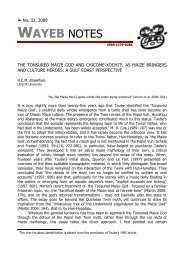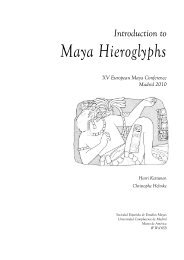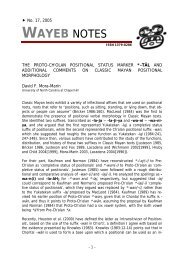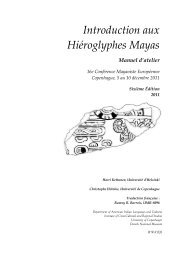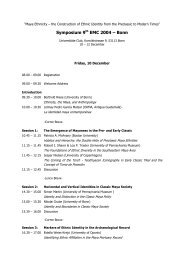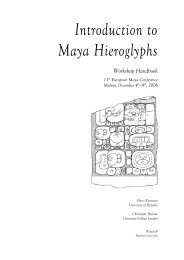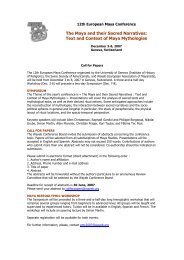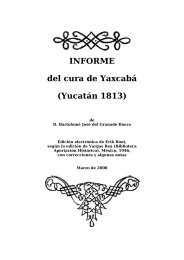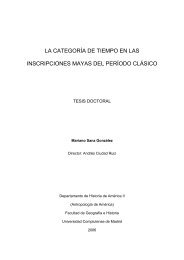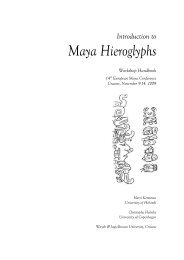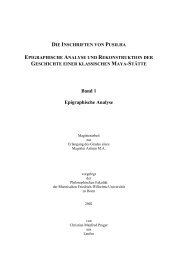Introduction to Maya Hieroglyphs - Wayeb
Introduction to Maya Hieroglyphs - Wayeb
Introduction to Maya Hieroglyphs - Wayeb
You also want an ePaper? Increase the reach of your titles
YUMPU automatically turns print PDFs into web optimized ePapers that Google loves.
Kettunen & Helmke 2011<br />
Thematic Dictionary: Nouns and Adjectives<br />
Root/stem: Transliteration: Transcription: GC: Translation:<br />
wayib / wayab<br />
WAY-bi<br />
WAY[bi]<br />
wa-ya-ba<br />
way-[i]b<br />
way-[i]b<br />
way-ab<br />
n<br />
lit. “sleep-thing”<br />
reference <strong>to</strong><br />
“dormi<strong>to</strong>ries” or a<br />
“sleeping quarters” or a<br />
domicile<br />
we’em WE’-ma we’-[e]m n lit. “eat” closed off by an<br />
agentive suffix –em for<br />
“eater”; or more freely an<br />
“eating utensil”<br />
designation used for a<br />
ceramic serving vessel<br />
we’ib WE’-i-bi we’-ib n lit. “eat-thing” or more<br />
freely an “eating utensil”;<br />
designation used for a<br />
ceramic serving vessel<br />
wi’<br />
WI’<br />
wi<br />
wi’<br />
wi’<br />
n<br />
“root, tuber”<br />
winak wi-na-ke winak- n “man, person, human”<br />
see also maak and winik<br />
winik<br />
wi-ni-ki<br />
wi-WINIK-ki<br />
WINIK-ki<br />
wi-WINIK<br />
WINIK<br />
winik<br />
winik<br />
winik<br />
winik<br />
winik<br />
n<br />
“man, person, human”<br />
see also maak and winak<br />
witz<br />
wi-tzi<br />
wi-WITZ<br />
WITZ<br />
witz<br />
witz<br />
witz<br />
n<br />
“mountain, hill”<br />
woj / wooj / wo’j wo-jo<br />
wo-jo-li<br />
wo-jo-le<br />
wo-hi<br />
wo-o-ja<br />
wo-ja<br />
woj<br />
woj-[i]l<br />
woj-[e]l<br />
wooj<br />
woj / wo’j<br />
woj / wo’j<br />
n<br />
“glyph, character” could<br />
be extended <strong>to</strong> “sign”<br />
and “grapheme”<br />
xaman<br />
xa-ma-MAN-na<br />
xa-MAN-na<br />
xa-MAN<br />
xaman<br />
xaman<br />
xaman<br />
n<br />
“north” – cardinal<br />
direction; used in the<br />
Classic period in the<br />
Lowlands; replaced by<br />
nal in the Postclassic<br />
xib<br />
xi-bi<br />
XIB<br />
xib<br />
xib<br />
n<br />
“person, man”<br />
xoktuun xo-ko-TUN-ni xok-tuun cn “counting-s<strong>to</strong>ne”<br />
xook<br />
XOK-ki<br />
XOK<br />
xook<br />
xo[o]k<br />
n<br />
“shark” perhaps<br />
referring specifically <strong>to</strong><br />
the species of sharks that<br />
live in the Usumacinta<br />
xo(l)te’ xo-TE’ xo[l]te’ cn “staff, ba<strong>to</strong>n”<br />
125/154



